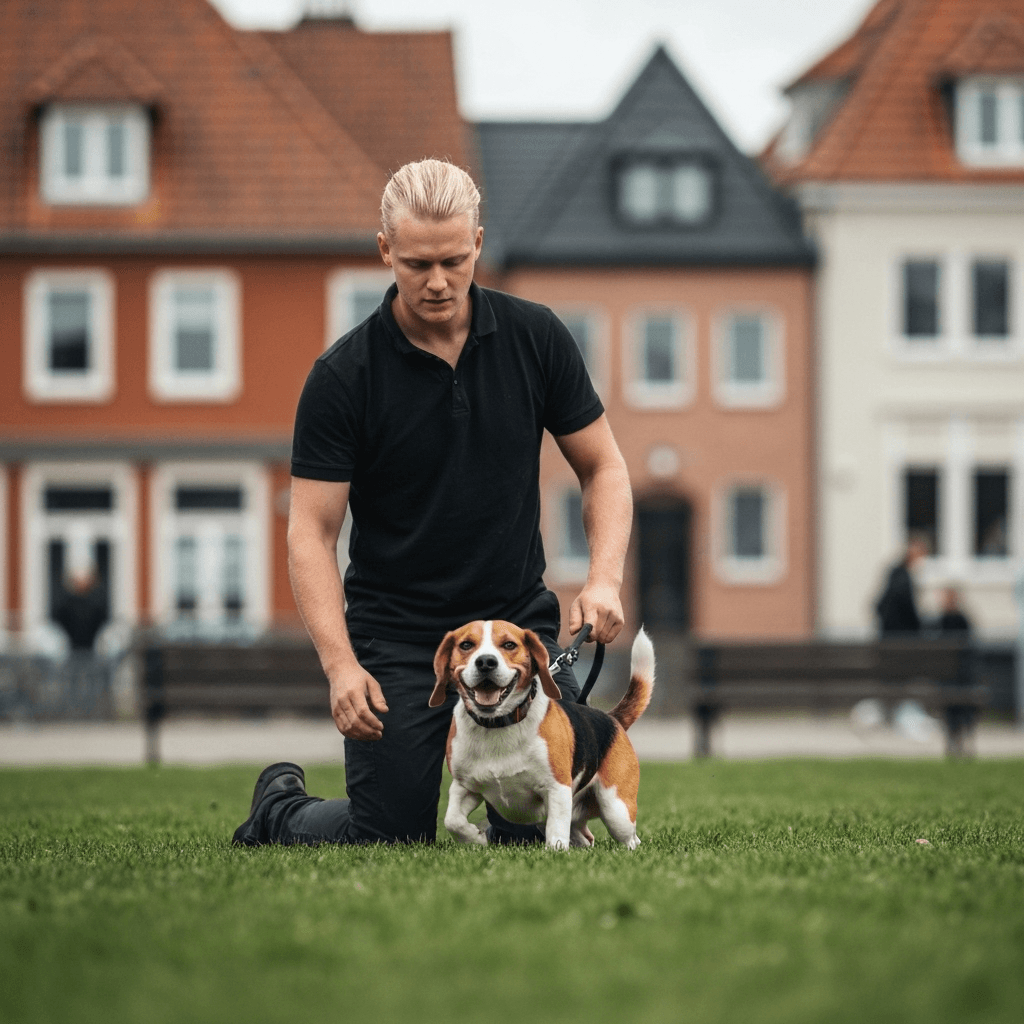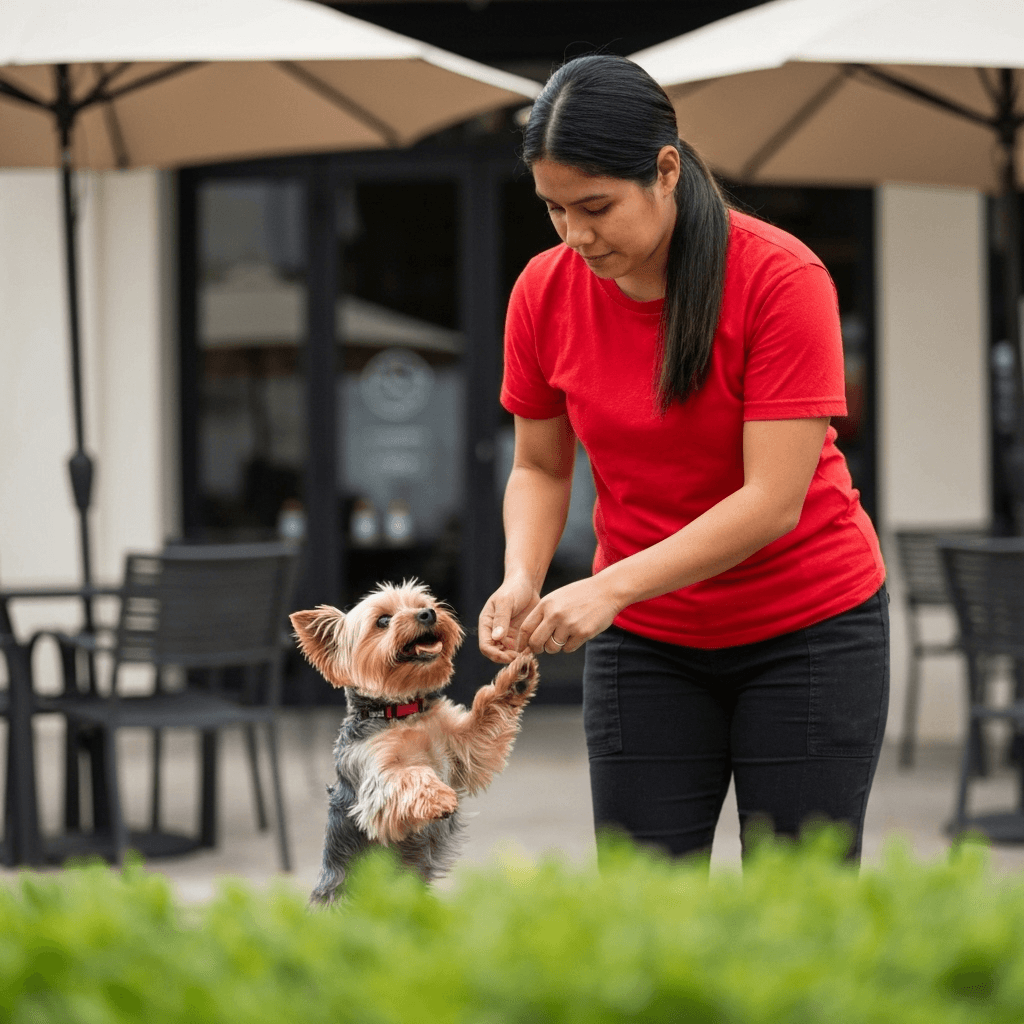Your Complete Guide to Choosing a Dog Trainer in Prairie du Sac
Living with a dog in Prairie du Sac means you’ll want calm manners on the Great Sauk State Trail, polite greetings along Water Street, and reliable recall before exploring those open spaces by the Wisconsin River. Finding the right dog trainer helps your pup succeed in all the real places you actually go each week.
When you’re looking around Prairie du Sac and the surrounding Sauk County area, you’ll find trainers with different approaches and specialties. Some focus on basic obedience, while others work with more challenging behaviors like reactivity or separation anxiety. The key is finding someone who understands both your dog’s needs and the local lifestyle.
How to Choose the Right Trainer
The best trainers in this area use positive reinforcement methods and can help your dog navigate real Sauk Prairie situations. Your dog needs to walk nicely past downtown patios, settle calmly while kids ride by on bikes, and actually listen to you even when there’s interesting wildlife around the trails.
Credentials aren’t everything, but they do help you compare trainers’ experience and training philosophy. Look for these recognized certifications when you’re researching options:
- CPDT-KA shows solid, tested knowledge of dog behavior
- KPA-CTP means deep skills in reward-based training methods
- IAABC-CDBC indicates experience with complex behavior cases
- CBCC-KA focuses on behavior consulting
- CTC represents advanced, science-based training approaches
You’ll also need to decide between different training formats. In-home training works great for issues like door manners, yard reactivity, and walking skills in your own neighborhood. Group classes are perfect once your dog can focus around other dogs, and day training helps when your schedule is packed.
If you’re considering board and train programs, make sure you understand where your dog will stay overnight. More importantly, ask how you’ll learn the skills needed to maintain your dog’s progress once they come home.
Common Dog Training Methods in the Area

Most successful trainers around Prairie du Sac use reward-based methods that build trust and keep training stress-free for both families and neighbors. These approaches also make it much easier to follow Sauk County’s rules about controlling your dog and preventing nuisance behaviors in public places.
Basic obedience training covers the essentials: sit, down, stay, come, place, and leash skills. These basics help your dog handle errands on Prairie Street and enjoy patio time without pulling or jumping on people. Most dogs pick up these skills pretty quickly with consistent practice.
Puppy training focuses on the critical early months with socialization, potty training, bite control, crate comfort, and early leash training. Getting these foundations right from the start saves you from bigger problems later and helps your puppy grow into a well-adjusted adult dog.
When dogs have more challenging issues, behavior modification becomes necessary. This approach helps with reactivity, fearfulness, resource guarding, or separation anxiety using gradual desensitization and counterconditioning techniques. These cases usually take more time and patience, but the results are worth it.
You’ll find trainers offering private lessons, group classes, and day training options throughout the area. The right choice depends on your specific goals, your schedule, and how your individual dog learns best. Just make sure to avoid any methods that rely on fear, intimidation, or pain – safer, humane training produces much better long-term results and keeps your public outings peaceful.
Average Cost of Dog Training in Prairie du Sac (Updated for 2025)
Training prices in Prairie du Sac and surrounding Sauk County areas vary based on the trainer’s experience, session length, and type of service you choose. Here’s what local dog owners typically pay for different training options:
| Service Type | Average Cost (Prairie du Sac/Sauk County) |
|---|---|
| Puppy classes 4–6 weeks | $140–$225 total |
| Group obedience classes 4–6 weeks | $150–$260 total |
| Private lessons 60–90 min | $95–$160 per session |
| In-home coaching packages 4–6 visits | $380–$780 total |
| Day training per week | $425–$850 per week |
| Behavior consult initial | $110–$190 |
| Board and train 2–4 weeks | $1,800–$3,800 total |
Keep in mind that you might pay extra travel fees if you live in a more rural area or farther from the trainer’s base. Rates also tend to be higher for aggression cases or advanced behavior work since these require more specialized skills and experience.
Before you commit to any program, ask what’s included in the price, how they track progress, and whether they offer a brief consultation or phone screening to make sure you’re a good fit.
Questions to Ask Potential Trainers
When you’re interviewing trainers, these questions will help you find someone who’s right for your situation:
- What training methods do you use, and how do you keep sessions positive and low-stress?
- Which credentials do you hold, and how do you stay current with continuing education?
- How will you tailor the training plan to Prairie du Sac life, like trail traffic, patio dining, and family parks?
- Do you offer private lessons, group classes, in-home coaching, or day training, and which would work best for my goals?
- How will we measure progress and decide when to add distractions or new challenges?
- What’s the total price, including any travel fees, equipment, or cancellation policies?
- Do you carry liability insurance, and can you share proof of coverage?
- For reactivity or aggression cases, will you coordinate with my veterinarian if needed?
- If you use local parks for training, do you obtain any required permits from village or county authorities?
Local Rules and Considerations
Prairie du Sac follows village and Sauk County guidelines designed to keep neighborhoods and parks safe and enjoyable for everyone. Understanding these rules helps you plan where and how to train your dog in public spaces.
The basic requirements are straightforward: keep dogs leashed and under control in public areas unless you’re in a designated off-leash dog park. Wisconsin law requires dogs 5 months and older to be licensed annually with proof of current rabies vaccination – you can handle this through the village or county treasurer’s office.
Make sure your dog wears their current rabies tag on their collar during public outings. Always carry waste bags and clean up after your dog, using park or street waste cans. Persistent barking, jumping on people, or allowing your dog to roam can result in nuisance complaints and fines, so it’s worth working on calm greetings and home-alone habits early in your training.
For trainers, Wisconsin doesn’t require special licensing, though trainers who sell or shelter dogs may need state permits. Those offering board and train services should verify local kennel or zoning requirements and maintain business insurance.
If you need information about local animal control, licensing, bite incidents, or specific ordinances, start with Sauk County Animal Control. For statewide rabies requirements and vaccination guidelines, check Wisconsin DHS Rabies information. Many owners handle dog licensing through the county – find details at Sauk County Dog Licenses.
Local Resources for Dog Owners
The Prairie du Sac area offers several great spots for training and exercising your dog. Sauk Prairie Dog Park provides fenced, off-leash areas with posted rules – it’s perfect for practicing recall and working on polite greetings, especially during quieter hours when there are fewer distractions.
If you’re willing to drive a bit, Lodi Rotary Dog Park offers another fully fenced option with separate areas for different sized dogs. Baraboo Dog Park gives you yet another safe, enclosed space for off-leash training work within Sauk County.
The Great Sauk State Trail welcomes leashed dogs and provides excellent real-world training opportunities. You’ll encounter bikes, strollers, joggers, and families, making it ideal for practicing loose-leash walking and teaching your dog to focus on you despite distractions.
Village parks like the Riverwalk areas and neighborhood green spaces work well for shorter training sessions. These spots are great for practicing stays, working on manners, and teaching your dog to settle calmly in public. Just make sure to follow any posted rules about dogs in these areas.

Common Questions About Dog Training in Prairie du Sac
How much does in-home dog training cost around here?
Most Prairie du Sac area trainers charge between $95 and $160 per in-home visit, with better rates when you purchase a package of sessions. Complex behavior cases often start at the higher end of that range.
Is in-home dog training worth the extra cost?
Absolutely, especially for common household issues. You’ll work on door greetings, counter-surfing, yard reactivity, and leash skills right where the problems actually happen, then practice on your regular walking routes and neighborhood sidewalks.
Can I pay someone to house train my dog?
Many trainers offer puppy programs that include schedules and techniques for potty training, crate training, and early manners. Day training can speed up the process when combined with clear homework assignments for you to follow.
What is the 3-3-3 rule for dog training?
This guideline suggests planning for about 3 days for your dog to decompress in a new situation, 3 weeks to learn new routines, and 3 months to feel fully settled and confident. Good training plans respect this natural timeline rather than rushing progress.
How long will it take to reach my training goals?
Most puppies and friendly adult dogs show steady progress in 4 to 8 weeks with daily practice sessions. Dogs with reactivity, fear issues, or aggression typically need several months of careful behavior modification work to see lasting changes.
What should I bring to group classes?
Pack a flat collar or harness, a standard 6-foot leash, high-value treats your dog loves, water for both of you, and current vaccination records if the trainer requests them. Skip retractable leashes since they create safety issues in group settings.
What’s the leash law in Prairie du Sac?
Dogs must be leashed and under control in all public spaces except designated off-leash dog parks. Keep a standard 6-foot leash with you when walking on village sidewalks, trails, and in parks.
Do I need a dog license in Prairie du Sac or Sauk County?
Yes, Wisconsin requires annual licensing for all dogs 5 months and older through your local municipality or county, along with proof of current rabies vaccination. Check Sauk County Dog Licenses for local details and fees.
What vaccinations does my dog need in Wisconsin?
Rabies vaccination is required by state law, and your veterinarian will likely recommend distemper-parvo combination and bordetella vaccines based on your dog’s lifestyle and exposure risks. Find current guidelines at Wisconsin DHS Rabies.
Are dog trainers required to be licensed in Wisconsin?
No special state license exists for dog trainers. However, businesses that sell or shelter dogs may need state licensing, and any trainer offering board and train services should verify local kennel or zoning requirements and carry liability insurance.
Where can I practice off-leash recall safely?
Stick to fenced dog parks like Sauk Prairie Dog Park, Lodi Rotary Dog Park, or Baraboo Dog Park for off-leash work. Start during quieter times of day with fewer distractions, and always follow posted park rules.
Which local dog parks allow training sessions?
Sauk Prairie Dog Park, Lodi Rotary Dog Park, and Baraboo Dog Park all work well for practicing recall and attention exercises in safely fenced areas. Keep training sessions short and positive so you don’t interfere with other park users.
What trails and outdoor areas allow dogs for training practice?
The Great Sauk State Trail welcomes leashed dogs and provides perfect conditions for practicing loose-leash walking and focus work around bikes, joggers, and families. Always keep your dog leashed and be courteous to other trail users.
Do trainers need special permits to work in local parks?
While Prairie du Sac doesn’t advertise specific trainer permit requirements, many municipalities require proof of liability insurance for commercial park use. Ask any potential trainer for proof of insurance and confirmation they have necessary local permissions.
What training certifications should I prioritize when choosing a trainer?
Look for respected credentials like CPDT-KA, KPA-CTP, IAABC-CDBC, and CBCC-KA for behavior cases. Advanced programs like CTC indicate science-based training approaches and ongoing education.
Finding a professional dog trainer who understands life in the Sauk Prairie area, uses humane methods, and helps you set realistic goals makes all the difference in your success. Focus on building a practical training program, committing to regular practice sessions, and celebrating steady progress. Before you know it, you’ll have a relaxed, well-behaved dog who can handle daily routines with confidence and enjoy all the great outdoor opportunities this area has to offer.
